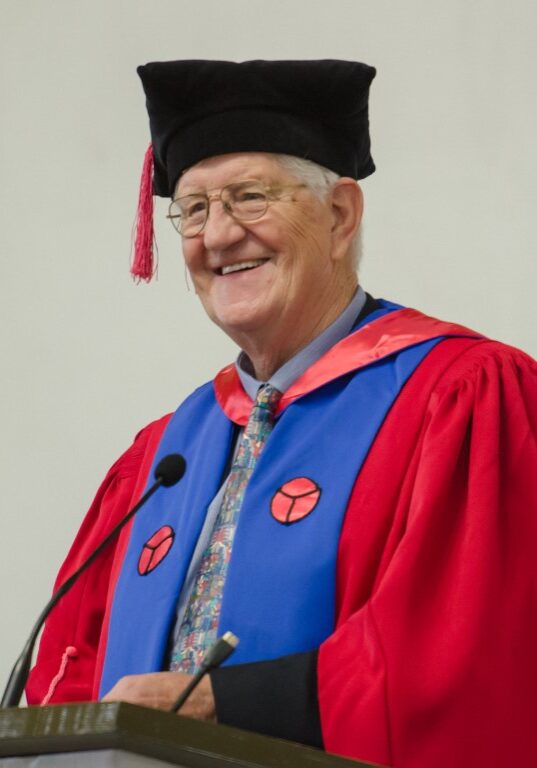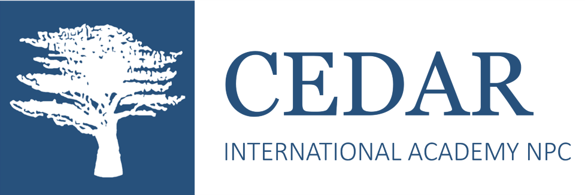ADDRESS BY PROF. J L (HANNES) VAN DER WALT, CEDAR INTERNATIONAL ACADEMY, 12 MAY 2024
Sanibonani nonke!
Dear Dr Ilsa Vermaak, CEO of Cedar International Academy, Mr Michael Ngubane, Chairman of the Governing Board, members of the Board, members of the academic staff, members of the administrative staff, colleagues, students – Ladies and Gentlemen!
When I received a message from Dr Elfrieda Fleischman on Research Gate informing me that the Academy was looking for me to invite me to participate in this festive occasion, it created a bridge spanning three decades in the histories of the Academy as a Christian higher education institution, and the former Potchefstroom University of Christian Higher Education (PU for CHE). I then duly received an invitation from Dr Vermaak to deliver this address. I feel deeply honoured and grateful to be part of this illustrious occasion, and to be in this great venue. I will devote my address to a brief look back into the past, and conclude with a brief message regarding the future of the Academy, and that of all higher education institutions operating on Biblical principles in adhering to the task of teacher education.

First, then, a look into the past.
I was acting Dean of the Faculty of Education of the PU for CHE when, in December 1993, I received a fax from Mrs Kay Stegen, the Principal of Cedar College of Education, in which she explored the possibility of the PU for CHE accrediting the programmes of the newly created Cedar College of Education. After consulting with the Management Committee of the University, I wrote a letter to Mrs Stegen early in 1994 informing her that the University unfortunately did not see its way clear to accredit the programmes of an institution that had just started up. After consulting with the Rector of the Potchefstroom College of Teacher Education (PCTE), Prof Roelf van Rooyen, I suggested to Mrs Stegen and to Rev Kjell Olsen that they negotiate with the PCTE, also an institution of higher education functioning on Christian principles, to help them with the composition
of their programmes with a view to possible accreditation by the PU for CHE. The Management of the PCTE declared its willingness to work with Cedar College of Education so that the programmes of the latter would in due course be able so be accredited by the PU for CHE. Dr A P (Pieter) Brugman, a Vice-Rector of the PCTE, and Dr Rina van Zyl, one of its Heads of Department, took up the challenge and facilitated a procedure that allowed the PU for CHE to go ahead with the accreditation of Cedar College of Education in 1996.
I commenced the accreditation process by steering a Memorandum of Co-operation and Accreditation between the Potchefstroom University for Christian Higher Education and Cedar College of Education through the various channels at the former. The two institutions of higher education entered into an agreement in 1996 in terms of which the PU for CHE would accredit the programmes of Cedar College of Education. The PCTE remained involved throughout. Staff members of the PU for CHE and of the PCTE paid several visits to Cedar College of Education, occasionally for officiating during graduation ceremonies. My colleagues and I were impressed by Mrs Kay Stegen as the soft-spoken driving force behind the College, and by the stature and the hospitality of Rev. Erlo Stegen. After my early retirement as Dean of the Faculty at the end of 2000, the project was handed over to my successor, Prof Hennie Steyn, and after him, Prof Petra Engelbrecht and finally Prof Robert Balfour.
The Faculty of Education of the PU for CHE and the PCTE merged in 2001. In the process also the open-distance teaching-learning programmes of the two institutions were merged and/or aligned. From this date on, the off-campus programmes of the Faculty of Education were managed by the Teacher Education Centre under the management of Prof Manie Spamer. After the merger of the PU for CHE with another institution in 2004 to form the new North-West University (NWU), the name of this Centre was changed to The School for Further Teacher Education (2006). The cooperation between Cedar College of Education and the newly created NWU remained in place for the next 8 years, until 2014, when a change in policy by the Department of Higher Education compelled the University and Cedar College of Education to terminate their cooperation/accreditation. The Department, having decided that Colleges of Education should no longer make
use of universities or other HEIs for accreditation, compelled Cedar College of Education to proceed with its own accreditation of programmes. It had to register with the Department as an institution of higher teaching and learning. Prof Herman van Vuuren of the PU for CHE’s Faculty of Education travelled to Cedar College of Education for the purpose of personally conveying the message that the NWU could no longer be allowed to accredit the programmes of Cedar College of Education. Cedar College of Education subsequently changed its name to Cedar International Academy NPC (CEDAR) and obtained registration as a private higher education institution in 2021.
I find your invitation to be present today, and to deliver this brief address at this illustrious occasion to be historically significant in that it has enabled us to recall a time when close bonds existed between two institutions of higher education based on Christian principles: the former Cedar College of Education on the one hand, and the former Potchefstroom University for Christian Higher Education on the other. After the merger in 2004, the North-West University gradually succumbed to a process of secularisation, and is today for all intents and purposes, a secular institution. (I must add, to its credit, that it has allowed me for more than two decades as a specialist researcher/ research fellow to continue doing research based on Biblical principles.)
But, let us now look ahead!
My message for the future is brief. Our Christian religion can be summarised in four key ideas, each of which has profound implications for education (pedagogy) and for teacher education:
- The creation of everything, including the human being, and the maintenance thereof by the Almighty God of the Scriptures. It is our task, as teacher educators, to continue reflecting on the meaning of this insight for our pedagogical work, namely the conviction that God has created everything, and that He is maintaining it on an ongoing basis. What does this mean for teacher education? How should teachers be equipped for working in and with God’s creation? What does the fact that we as human beings have been created in the image of God mean for pedagogy and teacher education?
- The fall into sin; creation and everything corrupted through sin; we live in a sinful, broken world. What does this insight imply for pedagogy and for teacher education in a broken world, in a sinful world? How do we cope with indiscipline, disobedience, corruption and crime in the world in which we live? How do we educate young people to operate to the glory of God in such a broken world? How should young people be equipped to be able to teach in such a corrupt and disruptive environment?
- Redemption through our Lord and Saviour, Jesus Christ. Through His redemptive work the brokenness of creation has in principle been healed. This is an ongoing process. What does this insight mean for pedagogy and for teacher education in practice? How can we contribute through education and through the forming of prospective teachers towards a greater understanding of what it means to have been saved from eternal death through the redemptive work of Jesus Christ? How can we equip young people to contribute to the healing of the broken world in which they find themselves?
- Sanctification through the work of the Holy Spirit. The Spirit is constantly working to sanctify believers, that is, to put them aside so that they can devote their time and energies to the work of the Lord. What does it mean, pedagogically, and in terms of teacher education, to have been “set aside”, chosen by God through His Holy Spirit, to have been specially selected as believers in Jesus Christ, to work in His Kingdom? How do we, as teacher educators, teachers and learners work towards the coming of God’s Kingdom in this world?
I feel privileged to have renewed my acquaintance with the people who are now carrying the torch of their predecessors at the Cedar Academy, people who are clearly deeply devoted to the task of continuing with teacher education on Christian/Biblical foundations, who have committed themselves to working on the foundations expressed in terms of the four principles (the ground-motif of the
Christian religion) outlined above. I extend heartfelt congratulations to the CEO, the Governing Body, the academic staff and the administrative staff for having reached the milestone of three decades of existence and devotion. I congratulate you for persisting with a Christian/Biblical approach to school education (teaching and learning) while at the same time not overlooking the contributions of scholars of other religious persuasions.
May you all have a long, fruitful and richly blessed teaching career. May God bless you all – and in particular Cedar International Academy as an institution - for the next three decades, and beyond!
I thank you!
